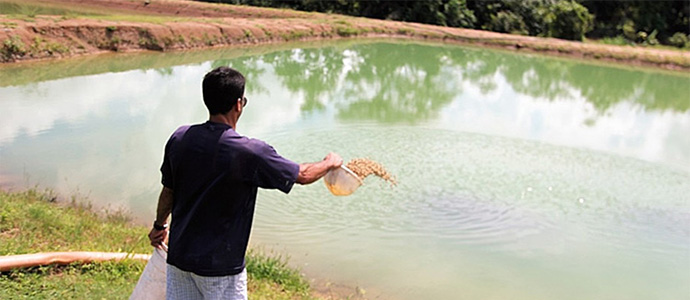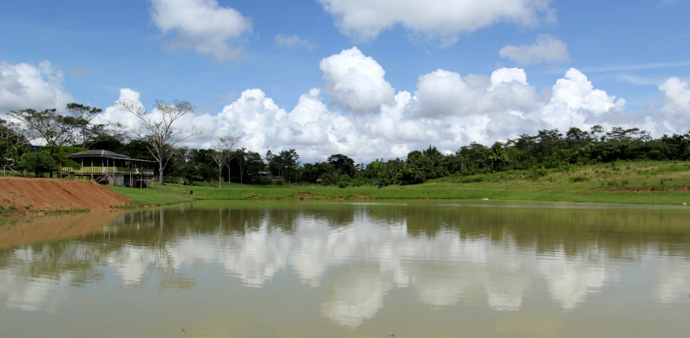A More Effishient Way to Conserve Forests and Support Livelihoods?by Deserai Crow and Elizabeth Albright |
| The CSTPR blog, Prometheus, was revived in 2016 to regularly feature content from CSTPR core faculty, research associates, postdocs, visitors, students and affiliates to serve as a resource for science and technology decision makers. This new dynamism reflects the new energies and pursuits taking place in and around CSTPR. Below we feature one of the recent Prometheus blog posts. |
Sr Luís tosses a handful of feed into the large pond in Acre, Brazil. Photo: Peter Newton. |
New research is studying innovative sub-national governance in Acre, Brazil Sr. Luís tosses a handful of feed into the large pond, and the water erupts as dozens of large Arapaima fish compete for it. These freshwater fish, known here in Brazil as pirarucu, are found naturally in Amazonian lakes but are also now produced by small-scale farmers who have adopted aquaculture as part of a diversified farming system. Pirarucu are a well-known and popular fish: they taste delicious, and since they can grow up to an enormous 200lbs, they produce large boneless fillets. Sr. Luís began investing in aquaculture a few years ago. He dug two ponds on his small farm in the state of Acre, in the northwest Brazilian Amazon, and stocked them with pirarucu. He receives the juvenile fish from a large facility in the state capital of Rio Branco, rears them on his farm, and sells the adult fish back to the same cooperative when they are large enough to slaughter and process. Aquaculture brings additional income to Sr. Luís’ farm. It is also a space-efficient production system, which enables him to comply with legal environmental obligations to retain large parts of his property as native Amazonian forest. Alternative and more traditional forms of animal agriculture, such as cattle ranching, are much less space efficient and are thus much less compatible with forest conservation. Investing in the infrastructure and training necessary to support a new industry in aquaculture is one of several initiatives designed, funded, and implemented by the Government of Acre in recent years. Acre has become famous as an example of strong subnational leadership, which is committed to a pathway of low-emissions development focused on forest conservation and sustainable socio-economic activities. The state thus contrasts sharply with many other parts of the Brazilian Amazon, where the model of rural development has been based on extensive cattle ranching and soy agriculture, which have been associated with widespread deforestation, environmental degradation, and social injustices. In addition to aquaculture, Acre’s state leadership has developed economies in other sectors that are also more compatible with forest conservation, including Brazil nuts, açai, natural rubber, and agroforestry. Each is supported through a combination of subsidies, training and capacity building, cooperatives, processing facilities, and markets, making engagement in these activities a viable livelihood strategy for rural producers. |
A large pond in Acre, Brazil. Photo: Peter Newton. |
I visited Acre in May 2017 and again in March 2018, to develop research and education collaborations with stakeholders in the Federal University of Acre (UFAC) and the Government of Acre. Acre was a founding member of the Governors’ Climate and Forests Taskforce (GCF), which is coordinated from CU Boulder, and Governor Tião Viana visited Boulder in January 2017 with a delegation of ministers and professors. An MOU between CU Boulder, UFAC, and the Acre Government resulted from this visit, and has laid the path for a growing number of collaborations. Together with colleagues from the GCF, the Laboratory for Energy and Environmental Policy innovation (LEEP), and the Center for International Forestry Research (CIFOR), I am conducting research in Acre to understand whether and how different sustainable development interventions that have been implemented as part of Acre’s low-emissions development strategy have had impacts on either rates of deforestation or the livelihoods of rural people. Using socio-economic panel data collected by CIFOR, and deforestation data from satellite imagery, we are quantifying changes over time in rural properties that have adopted these new production economies and those that haven’t. We hope that our work will provide the Acre Government with insights about the strengths and challenges of its policies and programs. Acre is a global leader in innovative subnational governance, and something of a laboratory for experimental governance and the development of best practices to reconcile environmental and development goals. As such, other GCF members are closely observing Acre’s progress, successes, and challenges, and are poised to learn from its example. There is, therefore, value to be gained from documenting and reporting the lessons learned from Acre’s experiences, to guide the pursuit of socio-environmental sustainability elsewhere. Peter Newton, peter.newton@colorado.edu |



